The ancient people were fond of the custom of pasting door gods, deeply rooted in long-standing cultural traditions and folk beliefs. The roots of this custom are far more profound and complex than depicted in a single story. In fact, the custom of pasting door gods does not only originate from the legendary story in “Journey to the West” where Wei Zhengmeng killed the Dragon King and Li Shimin ordered Qin Qiong and Yu Chigong to guard the gate to prevent the invasion of the Dragon King’s ghost, but also has a more ancient historical context.
Tracing back to ancient times, human reverence and worship of the natural world gave birth to various sacrificial rituals, including the worship of portals. In the Yin and Shang dynasties, the emperor had already performed the ritual of five sacrifices, and the gateway, as a necessary place for daily entry and exit, was naturally endowed with the important significance of guarding and warding off evil spirits. In the Zhou Dynasty, portal worship was included in the routine court rituals, demonstrating the ancient people’s emphasis on portal security. The image and personification of door gods are the products of this ritual activity, and they are endowed with the sacred duty of guarding their homes and resisting evil spirits.
Another widely circulated theory about the origin of door gods points to ancient mythological figures – Shentu and Yulei. It is said that these two immortals have the ability to catch ghosts and drive away evil spirits. Ancient people believed that drawing or posting their images on the portal could effectively resist the invasion of evil spirits and protect the safety of family members. This belief was particularly prevalent in the Han Dynasty. On New Year’s Eve, every household hung peach blossoms and reed ropes, and painted images of divine tea, jade mounds, and tigers on their doors to pray for peace and good luck in the new year.
As time goes by, the image and function of door gods gradually enrich and evolve. From the initial act of warding off evil and defending oneself, to later expressing people’s beautiful wishes for fame, wealth, longevity, and other aspects. During the Ming and Qing dynasties, the types of door gods became more diverse. Not only were there traditional military generals and door gods such as Qin Qiong and Yu Chigong, but also auspicious images such as Tian Guan and the God of Wealth, which symbolized wealth, prosperity, and longevity, reflecting people’s yearning and pursuit for a happy life.
The custom of pasting door gods is a unique folk cultural phenomenon formed by ancient people based on primitive worship and natural beliefs, which have evolved over thousands of years. It not only carries the simple wishes of ancient people for the safety of their homes, but also reflects the changes in social styles and public psychology in different historical periods.



